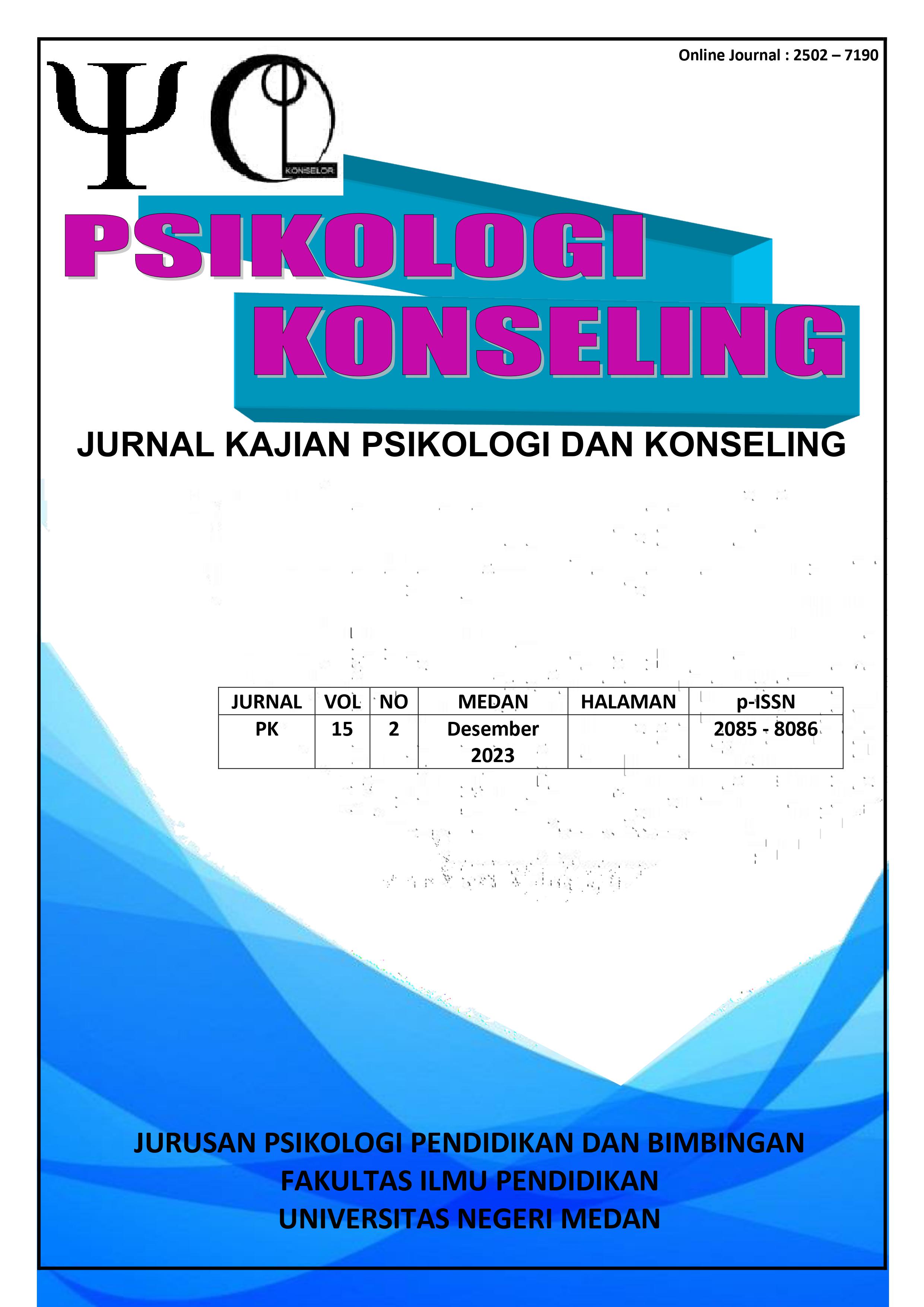EFIKASI DIRI, KETERLIBATAN KERJA DAN KEPUASAN KERJA PADA GURU DI SEKOLAH DASAR NEGERI DI KALIANDA
DOI:
https://doi.org/10.24114/konseling.v15i2.50598Keywords:
Efikasi diri, Keterlibatan kerja, Kepuasan kerja, Guru Sekolah DasarAbstract
Guru sebagai pendidik bertugas mentransfer sejumlah materi pelajaran kepada siswa, dan peran guru sebagai pendidik juga memerlukan kepercayaan diri yang tinggi, perasaan puas terhadap pekerjaannya, sikap antusias, dan keterlibatan penuh secara fisik dan emosional ketika melaksanakan pekerjaan untuk memberikan kinerja yang baik. Penelitian ini bertujuan untuk menguji pengaruh efikasi diri dan keterlibatan kerja terhadap kepuasan kerja pada guru Sekolah Dasar Negeri di Kalianda. Subjek dari penelitian ini terdiri dari 60 guru yang berusia 20-50 tahun dan memiliki pengalaman mengajar minimal satu tahun baik yang berstatus PNS atau honorer. Teknik sampling dalam penelitian ini menggunakan judgemental sampling. Selanjutnya data dianalisis menggunakan teknik regresi berganda dengan bantuan program IBM SPSS Statistics version 21 for Windows. Hasil analisis data menunjukkan bahwa efikasi diri dan keterlibatan kerja berpengaruh sangat signifikan terhadap kepuasan kerja Guru SDN di Kalianda, Lampung Selatan.References
As™ad, M. (1999). Psikologi industri: Seri ilmu sumber daya manusia. Yogyakarta: Liberty.
Bandura, A. (1997). Self-efficacy: The exercise of control. New York: Freeman.
Basikin, B. (2007). Vigor, dedication, and absorption: Work engagement among secondary English teachers in Indonesia. Paper presented at the annual AARE Conference, Fremantle, Perth, Australia.
Bili, D. K. (2014). Studi komparasi self-efficacy guru sdsn dan rsbi di daerah istimewa yogyakarta. Jurnal Penelitian Ilmu Pendidikan UNY, 7(2), 9-20. https://doi.org/10.21831/jpipfip.v7i2.4913
Canrinus, E., & Lorenz, H. M. (2011). Self-efficacy, job satisfaction, motivation and commitment: exploring the relationships between indicators of teachers™ professional identity™. European Journal of Psychology of Education, Vol. 27, No. 1, pp.115“132. doi: 10.1007/s.
Citradewi, A., & Soebandono, J. P. (2017). Pengaruh totalitas kerja dan modal psikologis terhadap kepuasan kerja driver Gojek di Jakarta Selatan. Journal of Psychology, 22(2), 151-164.https://repository.uinjkt.ac.id/dspace/bitstream/123456789/38116/2/ ARDISA%20CITRADEWI-J.%20P.%20SOEBANDONO.pdf
Federman, B. (2009). Work engagement: A road for creating profits, optimizing performance, and increasing loyalty. San Fransisco: Jossey Bass.
Garg, K., Dar, I. A., & Mishra, M. (2017). Job satisfaction and work engagement: A study using private sector bank managers. Journal Advances in Developing Human Resource, 00(0), 1-14. doi: 10.1177/1523422317742987.
Judge, T. A., & Robbins, S. P. (2008). Perilaku Organisasi. Jakarta: Salemba Empat.
Konermann, J. (2011). Teachers™ work engagement. Dutch: Wohrmann Print Service
Lester, P.E. (1987). Development and factor analysis of the teacher job satisfaction questionnaire (TJSQ). Journal Educational and Psychological Measurement, 47(1), 223-233. https://doi.org/10.1177/0013164487471031.
Man, G. S., & Hadi, C. (2013). Hubungan antara perceived organizational support dengan work engagement pada guru SMA swasta di Surabaya. Jurnal Psikologi Industri dan Organisasi, 2(2), 90-99. https://journal.unair.ac.id/filerPDF/jpio899b58839bfull.pdf
Mukhtar., Ali, H., & Rusmini. (2017) Kepuasan Kerja Guru. Jambi: Pusat Studi Agama dan Kemasyarakatan.
Perera, H. N., Granziera, H., Mcllveen, P. (2018). Profiles of teacher personality and relations with teacher self-efficacy, work engagement, and job satisfaction. Journal Personality and Individual Differences, 120, 171-178. https://doi.org/10.1016/j.paid.2017.08.034
Pratiwi, S.D. (2013). Pengaruh motivasi kerja, kepuasan kerja, kepemimpinan kepala sekolah menurut persepsi guru dan iklim sekolah terhadap kinerja guru ekonomi smp negeri di kabupaten wonogiri. Jurnal Pendidikan Insan mandiri, 2(1), 89-99. https://media.neliti.com/media/publications/13848-ID-pengaruh-motivasi-kerja-kepuasan-kerja-kepemimpinan-kepala-sekolah-menurut-perse.pdf
Pudjiastuti, E., & Sriwidodo, U. (2011). Pengaruh kompetensi, disiplin kerja, dan kepuasan kerja terhadap kinerja smp negeri 1 purwodadi grobogan. Jurnal Sumber Daya Manusia, 5(2), 120-131.
Putri, V. P., Priyatama, A. N., & Karyanta, N. A. (2014). Hubungan Antara Efikasi Diri Dan Optimisme Dengan Keterikatan Pada Karyawan PT. Bank Tabungan Negara (Persero) Cabang Solo. Skripsi. Universitas Sebelas Maret: Solo
Radosevich, D. J., Radosevich, D. M., Riddle, M. R., & Hughes, P. A. (2008). Goal orientation as a predictor of cognitive engagement, performance, and satisfaction. Journal of Academy of Business and Economics, 8, 46-55.
Ramadhan, D. M. (2020). Hubungan Antara Work Engagement Dan Kepuasan Kerja Pada Pegawai Negeri Sipil Dengan Dukungan Sosial Sebagai Variabel Moderator. Skripsi: UIN Yogyakarta.
Rayton, B. A., & Yalabik, Z. Y. (2014). Work engagement, psychological contract breach and job satisfaction. The International Journal of Human Resource Management, 25, 2382-2400. https://psycnet.apa.org/doi/10.1080/09585192.2013.876440
Saks, A. M. (2006). Antecedents and consequences of employee engagement. Journal of Managerial Psychology, 21, 600-619.
Schaufeli. Wilmar, Bakker. Arnold. (2004). UWES: Utrecht Work Engagement Scale Preliminary Manual.Occupational Health Psychology Unit UtrechtUniversity
Skaalvik, M. E., & Skaalvik, S. (2014). Teacher self efficacy and perceived autonomy: Relations with teacher engagement, job satisfaction, and emotional exhaustion. Journal Employment Psychology & Marketing, 114 (1), 68-77. http://dx.doi.org/10.1108/02683940610690169
Soto, M., & Rojas, O. (2019). Self-efficacy and job satisfaction as antecedents of citizenship behaviour in private schools. Journal Management in Education, 13(1), 82-96. http://dx.doi.org/10.1504/IJMIE.2019.10016607
Spector, P. E (1997). Job satisfaction survey. Florida: University of South Florida.
Stajkovic, A. D., & Luthans, F. (2011). Self efficacy and work related performance a meta analysis, Psychological Bulletin, 124 (2). 240-261. http://dx.doi.org/10.1037/0033-2909.124.2.240
Turkoglu, M.E., Cansoy. R., & Parlar. H. (2017). Examining relationship between teachers' self-efficacy and job satisfaction. Journal Educational Research, 5(5), 65-772. https://files.eric.ed.gov/fulltext/EJ1143895.pdf
Viel-Ruma, K., Houchins, D., Jolivette, K., & Benson, G. (2010). Efficacy beliefs of special educators: The relationships among collective efficacy, teacher self-efficacy, and job satisfaction. Journal Teacher Education and Special Education, 20(10) 1-9. http://dx.doi.org/10.1177/0888406409360129.
Werang, B. R. (2014). Pengaruh kepemimpinan transformasional kepala sekolah, moral kerja guru dan kepuasan kerja terhadap kinerja guru sdn di kota merauke. Jurnal Cakrawala Pendidikan. 33(1).128-137. https://doi.org/10.21831/cp.v1i1.1869
Yakin, M., & Erdil, O. (2012). Relationships between self-efficacy and work engagement and the effects on job satisfaction: A Survey on certified public. Journal Procedia-Social and Behavioral Science, 58, 370-378. https://doi.org/10.1016/j.sbspro.2012.09.1013
Downloads
Published
How to Cite
Issue
Section
License
Copyright (c) 2023 Lily Melinda, Nurul Qomariyah

This work is licensed under a Creative Commons Attribution-ShareAlike 4.0 International License.
This work is licensed under a Creative Commons Attribution-ShareAlike 4.0 International License.




